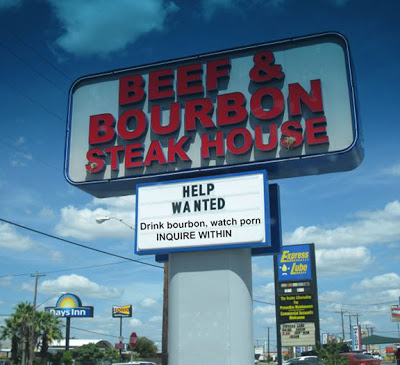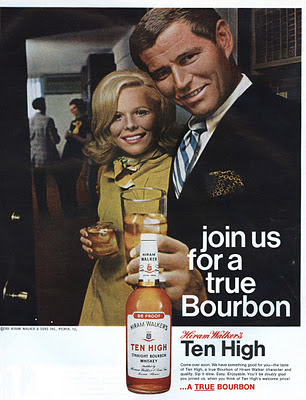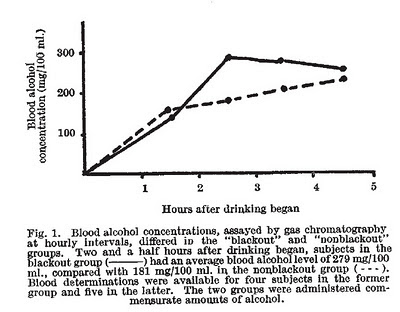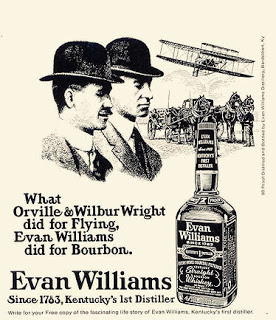Neuroscience

Our fun New Year's Eve post reviewed the suspected brain mechanisms of an alcohol blackout, or an episode of amnesia after a bout of heavy drinking (Rose & Grant, 2010). Alcohol-induced alterations of hippocampal circuits are thought to disrupt memory encoding, which can lead to two different types of blackout: en bloc, a complete loss of memory for the affected time period; and fragmentary, where bits and pieces of memories remain. The en bloc blackout is more likely to occur when a large quantity of alcohol is ingested in a short period of time.
In 1970, less was known about the causes and mechanisms of alcohol blackouts. A study by Goodwin and colleagues set out to learn more:

Ten men (mean age 41 yrs) were recruited as participants. Eight of them were alcoholics, and five experienced frequent blackouts. After fasting for 5 hrs, the experimental procedure was to drink 16-18 ounces of 86 proof bourbon on the rocks in 4 hrs. Cognitive testing began after the first hour of drinking to assess immediate, short-term, and remote memory as well as calculation abilities. In brief, the drunk participants looked at toys and watched porn and were asked to recall these items after a delay (Goodwin et al., 1970):
Other than wanting to create a highly desirable means of employment for the target population, why did the authors use erotic movies as stimuli?? (1) So that memory for arousing, emotional material could be compared to memory for the [presumably] more neutral toys; (2) Because very drunk men would be unwilling or unable to cooperate if more boring tests were used; and (3) Toys and porn were highly memorable to sober male subjects 24 hrs later.
The results indicated that all 10 subjects performed well when tested at the 2 min retention interval, but half of them showed impaired memory when tested 30 min and 24 hrs later. These same 5 participants were the ones with histories of blackouts. The authors speculated that the faster rise in blood alcohol levels (BAL) in the blackout subjects could be a reason for their amnesia. However, this explanation is implausible because the blackout group had poor memories at the earliest 30 min time point, when there was no difference in BAL between the groups.

So what have we learned? Retrieval of remote memories and simple calculation abilities are not impaired by heavy drinking, and...

References
GOODWIN, D., OTHMER, E., HALIKAS, J., & FREEMON, F. (1970). Loss of Short Term Memory as a Predictor of the Alcoholic “Blackout” Nature, 227 (5254), 201-202. DOI: 10.1038/227201a0
Rose, M. & Grant, J. (2010). Alcohol-Induced Blackout. Journal of Addiction Medicine, 4 (2), 61-73.
- Did I Do That? The Psychology Of Alcohol-induced Blackouts
The morning after. Photo credit: Sophie ScottWhen our autobiographical memory lets us down, how do we reconstruct the lost chapters? Two psychologists Robert Nash and Melanie Takarangi have identified the perfect population for investigating this very...
- The Mere Sight Of Alcohol Impairs Drinkers' Memories
For students who like a tipple or three, the mere sight of a bottle of Jack Daniels can have a detrimental effect on their memory. Dennis Kramer and Stephen Schmidt, who made the observation, said this is probably due to the emotional salience alcohol...
- Tapping Into People's Earliest Memories
When it comes to psychologists identifying people's earliest memories, the approach they take matters a lot. That's according to New Zealand psychologists Fiona Jack and Harlene Hayne who say their finding helps explain some of the mixed opinion...
- Where Did All The Memories Go?
What’s your earliest memory? If you’re an adult, it’s unlikely to be from before you were three and half to four years old. So what happens to your memories from before that age? It’s not that you never had any: two and three-year-olds gladly...
- The Unique Case Of “50 First Dates” Amnesia
Scene from 50 First Dates with Drew Barrymore and Adam Sandler. 50 First Dates maintains a venerable movie tradition of portraying an amnesiac syndrome that bears no relation to any known neurological or psychiatric condition (Baxendale, 2004).That isn't...
Neuroscience
Subjects Wanted to Drink Bourbon and Watch Erotic Films

Our fun New Year's Eve post reviewed the suspected brain mechanisms of an alcohol blackout, or an episode of amnesia after a bout of heavy drinking (Rose & Grant, 2010). Alcohol-induced alterations of hippocampal circuits are thought to disrupt memory encoding, which can lead to two different types of blackout: en bloc, a complete loss of memory for the affected time period; and fragmentary, where bits and pieces of memories remain. The en bloc blackout is more likely to occur when a large quantity of alcohol is ingested in a short period of time.
In 1970, less was known about the causes and mechanisms of alcohol blackouts. A study by Goodwin and colleagues set out to learn more:
Some psychiatrists believe blackouts to be a functional disturbance, related to guilt or anxiety. Others believe they reflect a toxic effect of alcohol on the brain. There are few data to support either concept. Blackouts usually occur erratically; comparable amounts of alcohol do not always produce memory loss, and it has not been possible to predict when an intoxicated person will suffer amnesia. During the amnesic interval, the person may function reasonably well and perform complicated acts, suggesting that the amnesia is retrograde. To confirm this, however, memory must be observed systematically during drinking periods followed by amnesia, which heretofore has not been done.Human subjects protection programs were less stringent (or non-existent) 40 years ago, so it was no problem to enlist unemployed alcoholic day laborers to drink a pint of bourbon and undergo memory testing of an unusual sort.
The subjects were recruited from individuals seeking daily employment at the Casual Labor Division of the Missouri Employment Office in St. Louis. Previous experience with this source had shown that a sizable proportion of the job applicants are alcoholic. Individuals were eligible for the study if they met two criteria; (a) willingness and ability to drink more than a pint of whiskey in a few hours, and (b) good physical health.

Ten men (mean age 41 yrs) were recruited as participants. Eight of them were alcoholics, and five experienced frequent blackouts. After fasting for 5 hrs, the experimental procedure was to drink 16-18 ounces of 86 proof bourbon on the rocks in 4 hrs. Cognitive testing began after the first hour of drinking to assess immediate, short-term, and remote memory as well as calculation abilities. In brief, the drunk participants looked at toys and watched porn and were asked to recall these items after a delay (Goodwin et al., 1970):
The tests were as follows. (a) Every 30 min the subject was shown a toy for 1 min, after which it was removed from sight. Two minutes later the subject was asked to recall the toy. If recalled correctly immediate memory was considered intact. Thirty minutes later he as asked again to recall the toy to measure short term memory...
(b) Every 30 min the subject was shown for 1 min a scene from an erotic movie. He was asked to describe and discuss the scene. If he could recall the scene 2 min later, this was considered a reflexion of intact immediate memory. Thirty minutes later he was again asked to recall the scene to measure short term memory.(c) Remote memory was tested by asking questions about early upbringing (name of schools, teachers, and so on) and events that occurred during the previous 2 days.(d) Ability to perform calculations was tested by asking the subject to do simple multiplication and subtraction tasks.
Other than wanting to create a highly desirable means of employment for the target population, why did the authors use erotic movies as stimuli?? (1) So that memory for arousing, emotional material could be compared to memory for the [presumably] more neutral toys; (2) Because very drunk men would be unwilling or unable to cooperate if more boring tests were used; and (3) Toys and porn were highly memorable to sober male subjects 24 hrs later.
The results indicated that all 10 subjects performed well when tested at the 2 min retention interval, but half of them showed impaired memory when tested 30 min and 24 hrs later. These same 5 participants were the ones with histories of blackouts. The authors speculated that the faster rise in blood alcohol levels (BAL) in the blackout subjects could be a reason for their amnesia. However, this explanation is implausible because the blackout group had poor memories at the earliest 30 min time point, when there was no difference in BAL between the groups.

So what have we learned? Retrieval of remote memories and simple calculation abilities are not impaired by heavy drinking, and...
...it is possible to predict amnesia during a drinking bout: on formal testing individuals who are later to experience amnesia will have a specific loss of short term memory correlated in time with the period of amnesia, while other types of memory are intact.A final lesson is that it was much easier to publish in Nature in 1970. Group comparisons with n=5? Fine and dandy. Pesky statistics and error bars on figures? Who needs them? Those were the days my friend...

References
GOODWIN, D., OTHMER, E., HALIKAS, J., & FREEMON, F. (1970). Loss of Short Term Memory as a Predictor of the Alcoholic “Blackout” Nature, 227 (5254), 201-202. DOI: 10.1038/227201a0
Rose, M. & Grant, J. (2010). Alcohol-Induced Blackout. Journal of Addiction Medicine, 4 (2), 61-73.
- Did I Do That? The Psychology Of Alcohol-induced Blackouts
The morning after. Photo credit: Sophie ScottWhen our autobiographical memory lets us down, how do we reconstruct the lost chapters? Two psychologists Robert Nash and Melanie Takarangi have identified the perfect population for investigating this very...
- The Mere Sight Of Alcohol Impairs Drinkers' Memories
For students who like a tipple or three, the mere sight of a bottle of Jack Daniels can have a detrimental effect on their memory. Dennis Kramer and Stephen Schmidt, who made the observation, said this is probably due to the emotional salience alcohol...
- Tapping Into People's Earliest Memories
When it comes to psychologists identifying people's earliest memories, the approach they take matters a lot. That's according to New Zealand psychologists Fiona Jack and Harlene Hayne who say their finding helps explain some of the mixed opinion...
- Where Did All The Memories Go?
What’s your earliest memory? If you’re an adult, it’s unlikely to be from before you were three and half to four years old. So what happens to your memories from before that age? It’s not that you never had any: two and three-year-olds gladly...
- The Unique Case Of “50 First Dates” Amnesia
Scene from 50 First Dates with Drew Barrymore and Adam Sandler. 50 First Dates maintains a venerable movie tradition of portraying an amnesiac syndrome that bears no relation to any known neurological or psychiatric condition (Baxendale, 2004).That isn't...
